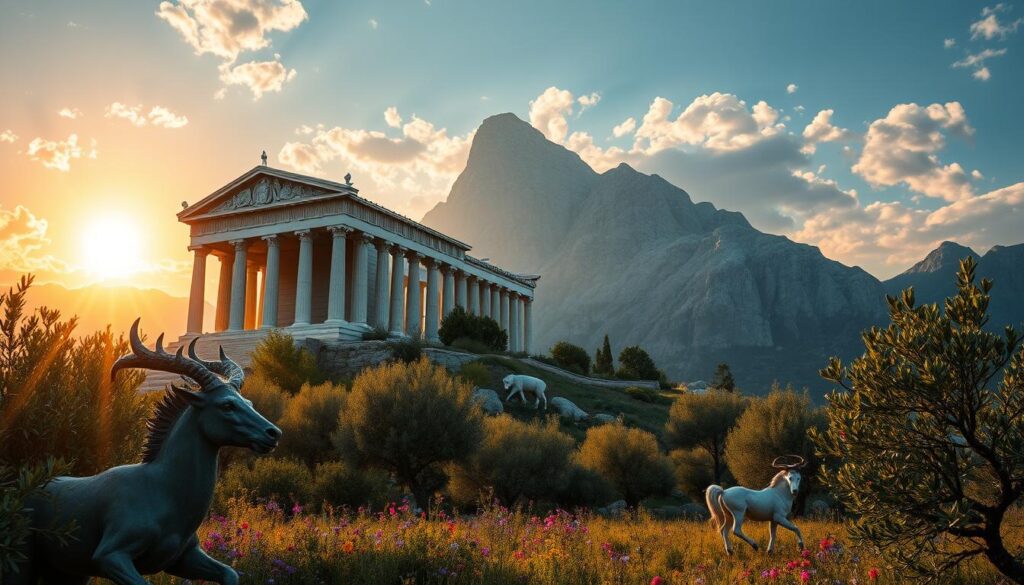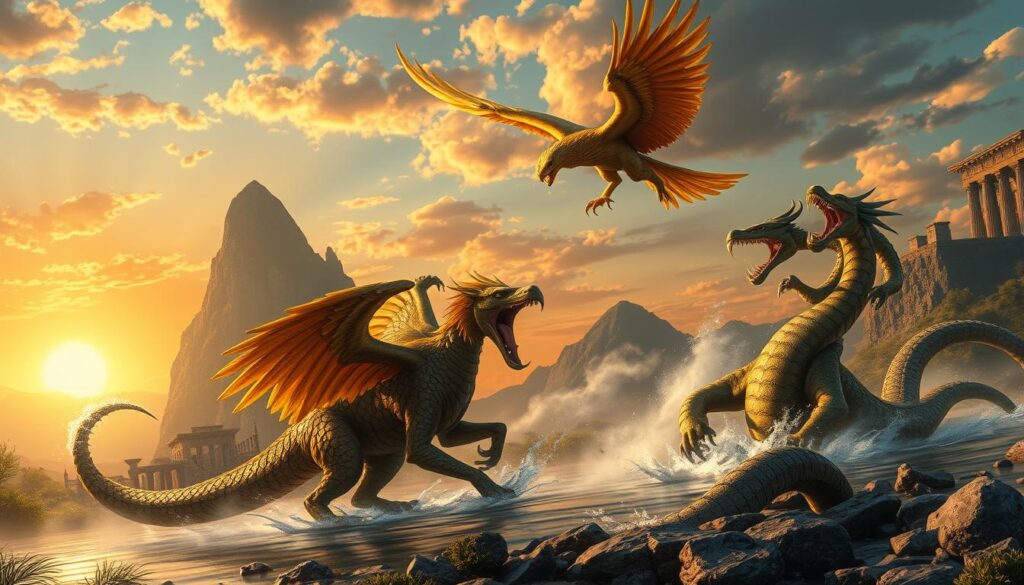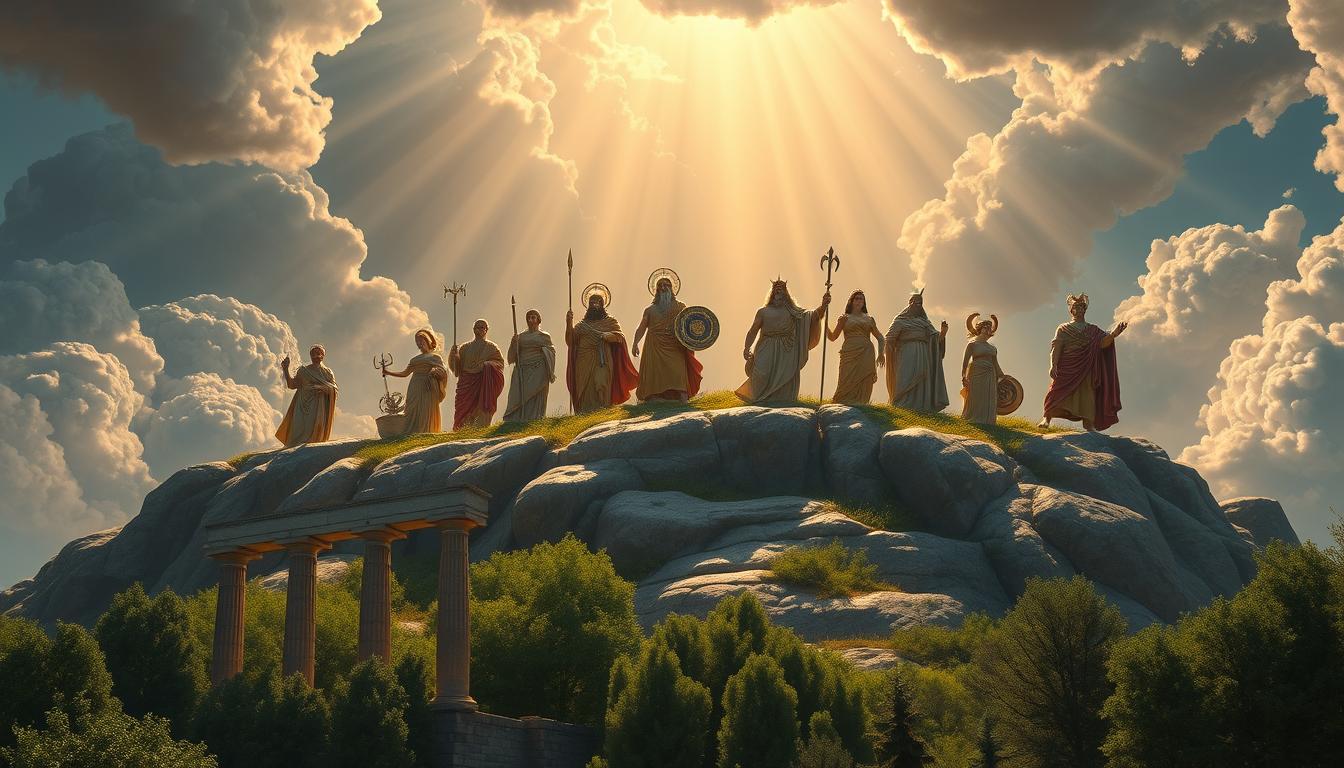The ancient Greek myths and legends have amazed people for thousands of years. They create a rich tapestry of stories that have deeply influenced Western culture. These tales, full of symbols and mythical gods, have left a lasting impact on art, literature, and philosophy. They have crossed the boundaries of their Hellenistic roots.
These stories, from the epic journeys of legendary heroes to the complex relationships between gods, have always fascinated scholars and fans. They show the cultural values and beliefs of the Greco-Roman world. They also share universal lessons about love, power, and the natural world.
Key Takeaways
- The ancient Greek myths and legends have endured for centuries, captivating audiences worldwide.
- These stories have profoundly influenced Western art, literature, and philosophy.
- The Greek mythology reflects the cultural values and beliefs of the Greco-Roman world.
- The myths offer universal lessons and timeless insights into the human experience.
- Exploring the depth and complexity of these legendary tales provides a window into the rich tapestry of classical literature.
Origins and Evolution of Greek Mythology
Greek mythology comes from ancient oral stories. Before writing, tales of gods, heroes, and creatures were shared by poets and bards. Ancient Greek poets like Homer and Hesiod shaped these stories into the Homeric epics we know today.
The myths of Greece changed over time, influenced by history. The rise and fall of civilizations and cultural exchanges shaped the stories of Greek gods.
The Role of Oral Tradition
In the beginning, oral storytelling kept myths alive. Poets and performers told and added to the tales, drawing in their audiences. This tradition let stories grow and change, showing the people’s values and beliefs.
Early Written Records and Documentation
As Greece grew, stories were written down. Ancient Greek poets like Homer and Hesiod wrote the myths in epic poems. These writings helped fix the core stories and shape our view of Greek mythology.
Influence of Historical Events
The myths of ancient Greece were shaped by history. Events like the Trojan War and cultural exchanges with other civilizations influenced the stories. The myths changed to reflect the times, showing the social, political, and cultural shifts.
| Ancient Greek Poet | Major Work | Contribution to Greek Mythology |
|---|---|---|
| Homer | Iliad and Odyssey | Establishing the core narratives of the Homeric epics |
| Hesiod | Theogony and Works and Days | Providing insights into the creation of the universe and the pantheon of Greek gods |
Greek Myths and Legends: Core Stories That Shaped Culture
The rich tapestry of Greek mythology is filled with creation myths, tales of the Olympian gods, and epic heroic quests. These stories deeply influenced ancient Greece’s culture and art. They still captivate people all over the world.
The Trojan War is at the center of these myths. It’s told in Homer’s Iliad and Odyssey. It follows the lives of heroes like Achilles, Odysseus, and Helen. Their stories are linked to the actions of the Olympian gods.
- The creation myths of ancient Greece, like the story of Prometheus, show deep beliefs about the divine and humans.
- Legends of heroic quests, like Perseus’s battle with Medusa or Theseus’s journey to the Underworld, highlight bravery and moral challenges.
- The Olympian pantheon of gods has fascinated people for centuries. It has inspired countless works of art and literature.
These core stories of Greek mythology have shaped Western civilization. They help us understand humanity, the divine, and the appeal of heroic quests. Their themes and popularity continue to inspire and captivate people everywhere.
“The Greeks had a knack for telling stories about the gods. All the good plots and really good beginnings of mysteries come from the Greeks.” – Lin-Manuel Miranda

The Pantheon of Greek Gods and Their Significance
The ancient Greek pantheon was a vast and intricate collection of deities. Each had their own unique domains, powers, and relationships. At the center were the Twelve Olympians, gods and goddesses who ruled over both mortal and immortal realms.
The Twelve Olympians
The Twelve Olympians were the most influential Greek deities. They included the mighty Zeus, the wise Athena, and the skilled Apollo. These powerful figures ruled over various aspects of human life, from love and war to wisdom and the arts.
Lesser-Known Deities
- The Greek pantheon also included a wide array of lesser-known Greek deities and mythological beings. Each had their own unique stories and divine attributes.
- These lesser-known figures, such as the trickster god Hermes and the sea nymph Amphitrite, played vital roles. They shaped the intricate mythological family trees and the complex web of divine relationships in Greek mythology.
Divine Hierarchies and Relationships
The relationships and power dynamics between the Greek gods were complex and ever-changing. Zeus, as the king of the gods, sat at the apex of the divine hierarchy. But his rule was frequently challenged by the ambitions and machinations of other deities.
The divine attributes and spheres of influence of these gods were often intertwined. This led to both cooperation and conflict among the Greek deities.
| Olympian God | Domain | Prominent Attributes |
|---|---|---|
| Zeus | King of the gods, ruler of the sky | Thunder, justice, law, order |
| Hera | Queen of the gods, goddess of marriage and family | Loyalty, fertility, motherhood |
| Poseidon | God of the sea, earthquakes, and horses | Strength, power, the ocean |
| Athena | Goddess of wisdom, war, and the arts | Intelligence, craftsmanship, strategy |
The intricate web of relationships and rivalries among the Greek deities continues to captivate audiences today. It showcases the enduring power and significance of these mythological figures.
Heroes and Monsters in Greek Mythology
Greek mythology is filled with legendary heroes and scary creatures. These characters have amazed people for centuries. They inspire many works in art, literature, and pop culture.
Hercules, a half-god, is famous for his strength and quests. He battled beasts like the Nemean Lion and Hydra. His stories show human bravery winning over darkness.
Perseus is known for defeating Medusa and saving Andromeda from a sea monster. His bravery and cleverness are legendary.
The Minotaur, with a bull’s head and human body, was a monster in the Labyrinth. It was defeated by Theseus, freeing the people of Crete.
“The creatures of Greek mythology have endured as symbols of our deepest fears and greatest aspirations, inspiring generations of storytellers and artists.”
Mythical creatures like Pegasus and Medusa symbolize our imagination. They represent the mysteries and wonders of nature.
The stories of Greek heroes and monsters still fascinate us. They show courage, sacrifice, and the human spirit’s triumph. These tales are a part of Western culture, offering a peek into ancient Greek civilization.

| Mythical Creature | Description | Significance |
|---|---|---|
| Hercules | The half-god known for his extraordinary strength and heroic quests | Symbolizes the triumph of human courage and determination over the forces of darkness |
| Perseus | The slayer of the gorgon Medusa | Represents bravery and ingenuity in the face of adversity |
| Minotaur | A monstrous being with the head of a bull and the body of a man | Symbolizes the dark and untamed forces that must be overcome |
Symbolic Meanings and Moral Lessons
Ancient Greek myths and legends are more than just stories. They hold moral allegories, Greek wisdom, and universal themes. These tales have shaped cultural values for thousands of years. They often serve as parables, teaching us valuable life lessons and showing us the core beliefs of the Hellenic world.
Life Lessons in Greek Tales
Greek myths are full of stories that teach us about the human condition. From Icarus’s pride to Odysseus’s perseverance, these tales warn us about the dangers of pride and the power of redemption. By exploring the mythological symbolism, we find universal themes that still touch our hearts today.
Cultural Values and Social Norms
- The Greek gods and goddesses showed us what virtues and vices were valued or not in Hellenic society.
- Myths like Oedipus’s story teach us about the importance of family and honoring our duties.
- Stories of heroes and divine help show us the values of bravery, loyalty, and believing in something greater.
Universal Themes
Underneath the magic of Greek myths are universal themes that everyone can relate to. Tales of love, loss, redemption, and fighting against fate or gods’ whims still move us all. By diving into these timeless stories, we learn about our shared experiences and collective wisdom.
| Universal Themes in Greek Myths | Examples |
|---|---|
| Love and Relationships | The tragic tale of Orpheus and Eurydice, the forbidden love of Aphrodite and Ares |
| Heroism and Bravery | The exploits of Hercules, the journey of Odysseus, the defiance of Prometheus |
| Fate and the Human Condition | The tragedy of Oedipus, the hubris of Icarus, the burden of the Titans |
“Greek myths are not mere stories, but rather timeless parables that continue to shape our understanding of the human experience.”
Conclusion
Greek mythology still fascinates people all over the world. These stories shape how we see ourselves and others. They tell of gods and heroes, showing us the power of love, loss, and victory.
Today, these old tales live on through art, books, and movies. They bring new life to old stories, speaking to us in our own time. By looking into these myths, we learn more about ourselves and our shared history.
As we end our exploration of Greek myths, we feel amazed and understand their lasting impact. These stories will keep inspiring us, helping us see the beauty of human experience and the power of our imagination.
FAQ
What is the significance of Greek mythology in Western culture?
Greek mythology has deeply influenced Western culture. It has shaped literature, art, philosophy, and cultural values for centuries. These ancient stories still captivate us and offer insights into the human experience.
How did the oral tradition influence the development of Greek myths?
The oral tradition was key in shaping Greek myths. These stories were shared by storytellers before being written down. This process allowed myths to change and reflect cultural and historical shifts.
What are some of the most well-known Greek creation myths?
Well-known Greek creation myths include Gaia and Uranus, the emergence of the Olympian gods, and Prometheus’ gift of fire to humans. These stories are deeply ingrained in Greek lore.
How did the Olympian gods influence Greek culture and society?
The Olympian gods, like Zeus, Athena, and Apollo, were crucial in Greek mythology. They influenced Greek culture, society, and politics. These gods were believed to guide various aspects of human life, from warfare to the arts.
What are some of the most iconic Greek heroes and their legendary feats?
Iconic Greek heroes include Hercules, Perseus, and Odysseus. Hercules completed the Twelve Labors, Perseus defeated Medusa, and Odysseus navigated the Trojan War and Homer’s Odyssey.
How do the moral lessons and symbolic meanings in Greek myths continue to resonate with modern audiences?
Greek myths teach universal lessons that are still relevant today. They warn against hubris, the dangers of defying the gods, and the power of love and loyalty. These stories continue to inspire and captivate us with their timeless themes and symbolism.
What is the lasting legacy of Greek mythology in contemporary culture?
Greek mythology’s legacy is seen in modern culture, from literature to film. These ancient stories continue to be reinterpreted and adapted. This ensures Greek myths remain a vital part of our cultural heritage.




